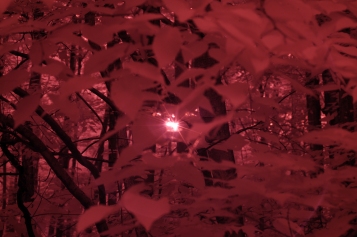commentary
 eligion is a philosophy in which one or another assumption about the afterlife is
granted. In Buddhism it's reincarnation. In Western religions it's a benevolent,
powerful God. These assumptions are immensely powerful: entire systems of ethics
have been constructed from them, and entire civilizations built on their foundations.
This makes their ideas worthy objects of study, even for those of us who approach
them as outsiders.
eligion is a philosophy in which one or another assumption about the afterlife is
granted. In Buddhism it's reincarnation. In Western religions it's a benevolent,
powerful God. These assumptions are immensely powerful: entire systems of ethics
have been constructed from them, and entire civilizations built on their foundations.
This makes their ideas worthy objects of study, even for those of us who approach
them as outsiders.
One of the most interesting of those ideas is the idea, found in Western religions, that creation is reversible: since God created everything, the instant he stopped exerting effort it would immediately collapse into nonexistence. Theists call this divine conservation. It's usually contrasted with ‘existential inertia’ (William E. Mann has an interesting chapter on it in The Oxford Handbook of Philosophy of Religion (reviewed here. More here.)) Divine conservation means that matter, energy, space and time are not fundamentally real, but are only byproducts of some other process, like light given off when something is heated.

Not real
Considering the implications of this, I'm surprised that theologians haven't followed up on it. It's a very Buddhist concept. It means that if our consciousness is real, we're trapped in an illusory universe and we have no way of knowing what the real world is like. If we're not real, that creates deep philosophical problems.
We have nothing like this in science. We always consider that a body in existence will remain in existence for eternity. Grand unified theories predict that, although electrons, photons, and space itself can last indefinitely, protons might decay after 1034 years. But even then there's still something left (positrons and neutral pions). It's as if religion and science had swapped ideas. But what if, at a more fundamental level, there were some substratum that we haven't discovered that is required to maintain everything in its extant state?
The Gnostics had some ideas along these lines: they believed God created not only the universe itself, but the intellectual concepts that underpin it: the concept of number, the concept of objects, even perhaps the very concept of Being. This implies that in some other universe, we might find not only particle masses and fundamental constants being different from our own, but also the basic mathematical and conceptual ideas. There might even be a universe where the very concept of existence is unknown—a world where there is no such thing as Being. The residents there would wonder what all our philosophers are nattering about.
In our universe, nonexistence is impossible: if something is void, it is eternally ungraspable. It's been argued that it's impossible even to talk about it. But contrary to what some annoying French philosophers say, naming the void does not change its state of being, flinging it out of the gray of nothingness into the sunlit world of existence. In our world, putting a void between a set of braces just creates a new empty set; it has no effect on the void's ontic state.
But our world might only be an infinitesimal corner of reality. It's easy enough to understand paradoxes like how in 3-dimensional space the sum of the three angles of a triangle can be greater or less than 360 degrees. But mathematicians have created even stranger spaces, such as ultrametric spaces, in which the basic rules of distance are different. In ultrametric space, points are nearby when their difference is divisible by a high power of some integer p. These so-called non-archimedean geometries, where the strong triangle inequality (|x + y| ≤ max(|x|, |y|) is satisfied, have proved extremely useful in phylogenetic analysis in biology.
If we can create such a universe on paper, could not a deity create one in reality? Would even non-existence be a sufficient obstacle for a sufficiently powerful deity, as Tillich argued?* Could there not be some strange world where existence, by any reasonable definition, is impossible?
As my former college roommate would say: I don't know, man, but yeah, ... could be, dude. Ffffffff.
* Paul Tillich said that to conceive of God as a necessary substance involves a contradiction. Existence would be too limiting for an omnipotent being, and God was ‘being-itself.’
